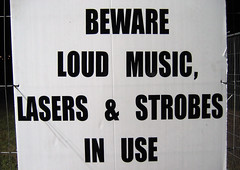
- Image by daveknapik via Flickr
One subject sure to get passions fired up for many is that of music in church. Craig Schwarze recently wrote an article for the Sydney Anglican website entitled “Turn Down the Volume” which has generated some discussion.
Now let me set the stage by telling you that I’m no musician — I am reasonably adept at playing only one instrument (the CD player), I can’t clap and sing at the same time, and my singing voice has been described as comparable with that of Marvin the Paranoid Android from the original Hitchhiker’s Guide to the Galaxy! So I’m purely a consumer here, not a purveyor.
Having said that, I’ll make a couple of points. First, there must be a distinction between a performance (where the audience is largely passive) and congregational singing, and the band needs to be cognisant of that difference. When playing music for the former, the band (and sound people) do not need to consider whether those in the congregation can hear each other — they don’t need to. However, for the latter, loud music hinders participation and appreciation. I’ve sat through music so loud I could barely hear myself sing, let alone anyone around me (although for some songs that may prove to be beneficial).
Second, much of the discussion lacks any meaningful engagement with theology. Singing and music are found everywhere in the Bible, and God’s people have always been a singing people, it would seem. So singing clearly has an important place in Christian gatherings.
What is interesting, however, is that although music is mentioned, the weight of the biblical focus is on words and hence on the content far more than the music. Eph 5:19 and Col 3:16 both point to a communicative aspect to singing. How can we be “speaking to one another in psalms, hymns, and spiritual songs” if we cannot hear one another?
Furthermore, although Scripture is filled with the words to songs, it contains scant reference to the music of those songs. The greatest song — the Song of songs — makes no mention of any music, the emphasis is entirely on the words.
This is not to say that there is no place for music, or that music is unimportant. As I noted, music and musical instruments are mentioned and are part of praise and worship. What is important, however, is that the demands of the music should not be allowed to override the words.